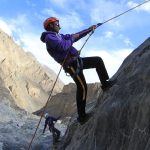Crack The Code: Mountain Climbing Question Answer Unveiled – Click To Conquer The Summit!
Mountain Climbing Question Answer: Unraveling the Challenges and Thrills
Introduction
3 Picture Gallery: Crack The Code: Mountain Climbing Question Answer Unveiled – Click To Conquer The Summit!



As an avid adventurer and nature enthusiast, I have always been drawn to the majestic beauty of mountains. The exhilarating feeling of conquering new heights and exploring uncharted territories has become an integral part of my life. However, embarking on a mountain climbing expedition is not without its challenges. In this article, I will delve into the world of mountain climbing, providing answers to common questions and shedding light on the intricacies of this thrilling activity.
What is Mountain Climbing?

Image Source: ytimg.com
Mountain climbing, also known as mountaineering, is the act of ascending mountains for various reasons, such as recreation, exploration, or reaching the summit. It involves tackling steep terrains, enduring extreme weather conditions, and utilizing specialized equipment and techniques to overcome obstacles along the way.
Who Can Engage in Mountain Climbing?

Image Source: cloudfront.net
Mountain climbing is a physically demanding activity that requires strength, endurance, and mental resilience. While anyone with a passion for adventure can engage in the sport, it is essential to undergo proper training and preparation to ensure safety. Beginners should start with easier climbs and gradually progress to more challenging expeditions under the guidance of experienced climbers or professional guides.
When is the Ideal Time for Mountain Climbing?
The ideal time for mountain climbing varies depending on the specific mountain and its geographical location. Factors such as weather conditions, seasonal changes, and available daylight play a crucial role in determining the best time for climbing. It is crucial to research and plan accordingly, taking into account the mountain’s climate and any potential risks associated with certain seasons.
Where Can You Experience Mountain Climbing?

Image Source: ytimg.com
Mountain climbing can be enjoyed in various locations worldwide, each offering unique challenges and breathtaking views. Some renowned mountain ranges that attract climbers include the Himalayas in Asia, the Andes in South America, the Alps in Europe, and the Rocky Mountains in North America. Choosing the right destination depends on personal preferences, skill level, and the desired level of difficulty.
Why Do People Choose Mountain Climbing?
People are drawn to mountain climbing for a multitude of reasons. For some, it is an opportunity to test their limits and push beyond their comfort zones. Others seek solace in the peaceful solitude of the mountains, away from the hustle and bustle of everyday life. The breathtaking views, sense of achievement, and camaraderie among climbers also contribute to the allure of this exhilarating activity.
How to Prepare for Mountain Climbing?
Proper preparation is crucial to ensure a safe and successful mountain climbing experience. Here are some essential steps to take:
1. Physical Fitness:
Engage in regular cardiovascular exercises, strength training, and endurance-building activities to improve overall fitness and stamina.
2. Skill Development:
Learn essential mountaineering skills, such as rope handling, navigation, and self-rescue techniques. Attend training courses or hire professional guides to acquire the necessary knowledge and expertise.
3. Gear and Equipment:
Invest in high-quality climbing gear, including harnesses, helmets, ropes, and crampons. Familiarize yourself with the proper usage and maintenance of each item.
4. Research and Planning:
Thoroughly research your chosen mountain, including its route options, potential hazards, and necessary permits. Develop a detailed itinerary and emergency contingency plans.
5. Acclimatization:
When climbing at high altitudes, allow your body time to acclimatize to the thinner air to prevent altitude sickness. Gradually ascend and spend additional days at intermediate camps to adapt to the changing conditions.
Frequently Asked Questions (FAQ) about Mountain Climbing
Q: Is mountain climbing dangerous?
A: Mountain climbing carries inherent risks, including falls, avalanches, and extreme weather conditions. However, with proper training, preparation, and adherence to safety protocols, these risks can be mitigated.
Q: Do I need previous climbing experience to start mountain climbing?
A: While previous climbing experience can be beneficial, it is not a prerequisite. Beginners can start with introductory courses or guided climbs to learn the necessary skills and techniques.
Q: Is mountain climbing an expensive activity?
A: Mountain climbing can be costly due to expenses such as travel, accommodation, gear, permits, and guide fees. However, it is possible to find budget-friendly options and tailor the experience to fit individual budgets.
Q: How long does it take to climb a mountain?
A: The duration of a mountain climb varies depending on factors such as the mountain’s height, difficulty level, and climber’s experience. It can range from a few days for easier climbs to several weeks for more challenging expeditions.
Q: What are some common challenges faced during mountain climbing?
A: Some common challenges include altitude sickness, fatigue, inclement weather, steep and slippery terrain, and limited oxygen availability at higher altitudes.
Pros and Cons of Mountain Climbing
Pros:
The exhilarating sense of accomplishment
Breathtaking views and immersion in nature’s beauty
Physical and mental challenges that foster personal growth
Camaraderie and shared experiences with fellow climbers
Cons:
Inherent risks and potential danger
Expensive gear and equipment
Physical demands and exhaustion
Environmental impact if not practiced responsibly
Conclusion
Mountain climbing is a thrilling and rewarding activity that offers a unique blend of physical exertion, mental fortitude, and awe-inspiring beauty. However, it requires careful planning, proper training, and an understanding of the risks involved. By following safety protocols, acquiring the necessary skills, and respecting the environment, one can embark on a journey that pushes boundaries and provides a profound sense of achievement. So gather your gear, lace up your boots, and embark on an adventure that will leave you breathless and yearning for more.
This post topic: Hiking


